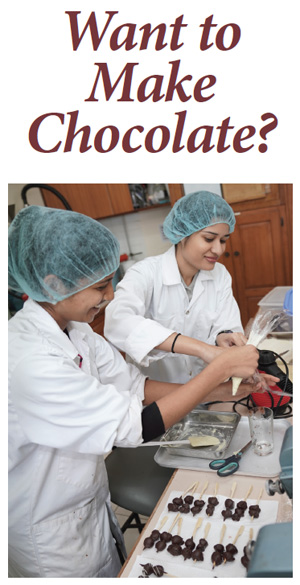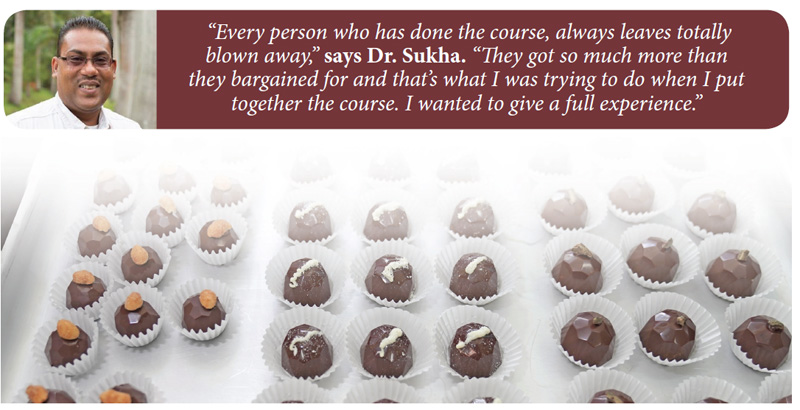 |
 |
 |
|
April 2018
|
Begun in 2013, and with more than 200 graduates, this course is the only fully intensive bean-to-bar training that exists in Trinidad and is, in fact, “one of the few courses in the world that gives you that in depth experience where you start off with cocoa beans and end up with at least six bars of chocolate that you would have made for yourself,” says Dr. Sukha. The intention, he says, is to give participants a holistic understanding of “the expression of genetic flavour potential.” At the bean to bar level, he explains, it is important for a chocolate maker to understand where the cocoa bean comes from – its variety, how the plant was grown and the beans fermented and dried, because all these elements impact the flavour of that bean. “You’re trying to capture the essence of the cocoa genetics you are working with and express that flavour through chocolate,” he explains. This five-day course begins with the backstory of the cocoa bean. Then, participants learn chocolate-making techniques, as well as the social and economic aspects of the industry, including team building and management, and marketing skills like developing their brand, creating their packaging and determining their prices. It’s an exhaustive course that ends in a field trip to the International Cocoa Genebank, Trinidad, so that students can experience a real cocoa estate. “Every person who has done the course, always leaves totally blown away,” says Dr. Sukha. “They got so much more than they bargained for and that’s what I was trying to do when I put together the course. I wanted to give a full experience.” In an endeavour to introduce another level of expertise to their chocolate-making training, and to satisfy students’ desires to do more with chocolate, Dr. Sukha is developing an Advanced Chocolate Making Course. It’s already in the works, with the Food Tech team having already undergone a train-the-trainers version of the course, with French chef and chocolatier, Régis Bouet. In creating this course, Dr. Sukha tried to determine “what are the most important things in our [local] context that would be useful as a next step.” There are many things, it turns out, including, but certainly not limited to, learning to make different types of ganache (which leads to truffles and other tasty confectionaries), enrobing, dipping and panning techniques to coat fruit, nuts and other fillings in chocolate, as well as perfect tempering techniques and chocolate moulding to create elaborate showpieces. With its Introductory Chocolate Making Course, and its soon-to-come Advanced Chocolate Making Course, the CRC aims to “create an awareness of the interconnectivity of all the activities along the cocoa value chain,” says Dr. Sukha. He explains that, when a cocoa farmer or chocolatier adds to their skill set and product offerings, they move along the chain and add value to their business. He breaks it down – “You start off with a tree which gives you a pod. If I were to sell the cocoa pod, I’ll get a certain price. If I sell the beans, I’ll get a higher price.” Keep moving along the chain, through the cocoa and chocolate production process, and your product’s value increases. For anyone with aspirations in our local cocoa and chocolate industry, the ability to make and sell chocolate is a vital skill, and with the high quality of cocoa that grows in Trinidad, the CRC wants to ensure that all have the opportunity to learn those skills. Visit the Cocoa Research Centre online to learn more about the Introductory Chocolate Making Course and all the work they do. (Serah Acham)
|

 Chocolate is passion. We give it as gifts to show love, we indulge in it to seek solace. Chocolate is one of the few foods with which we, human beings, have an emotional bond, says Dr. Darin Sukha, Head of the the CRC’s Food Technology section. When you make chocolate, he says, “you are communicating the expression of passion.” The CRC is on a mission to teach our local chocolatiers, cocoa farmers and anyone interested, to express that passion through Trinidad’s fine flavour cocoa beans, with its Introductory Chocolate Making Course.
Chocolate is passion. We give it as gifts to show love, we indulge in it to seek solace. Chocolate is one of the few foods with which we, human beings, have an emotional bond, says Dr. Darin Sukha, Head of the the CRC’s Food Technology section. When you make chocolate, he says, “you are communicating the expression of passion.” The CRC is on a mission to teach our local chocolatiers, cocoa farmers and anyone interested, to express that passion through Trinidad’s fine flavour cocoa beans, with its Introductory Chocolate Making Course. 